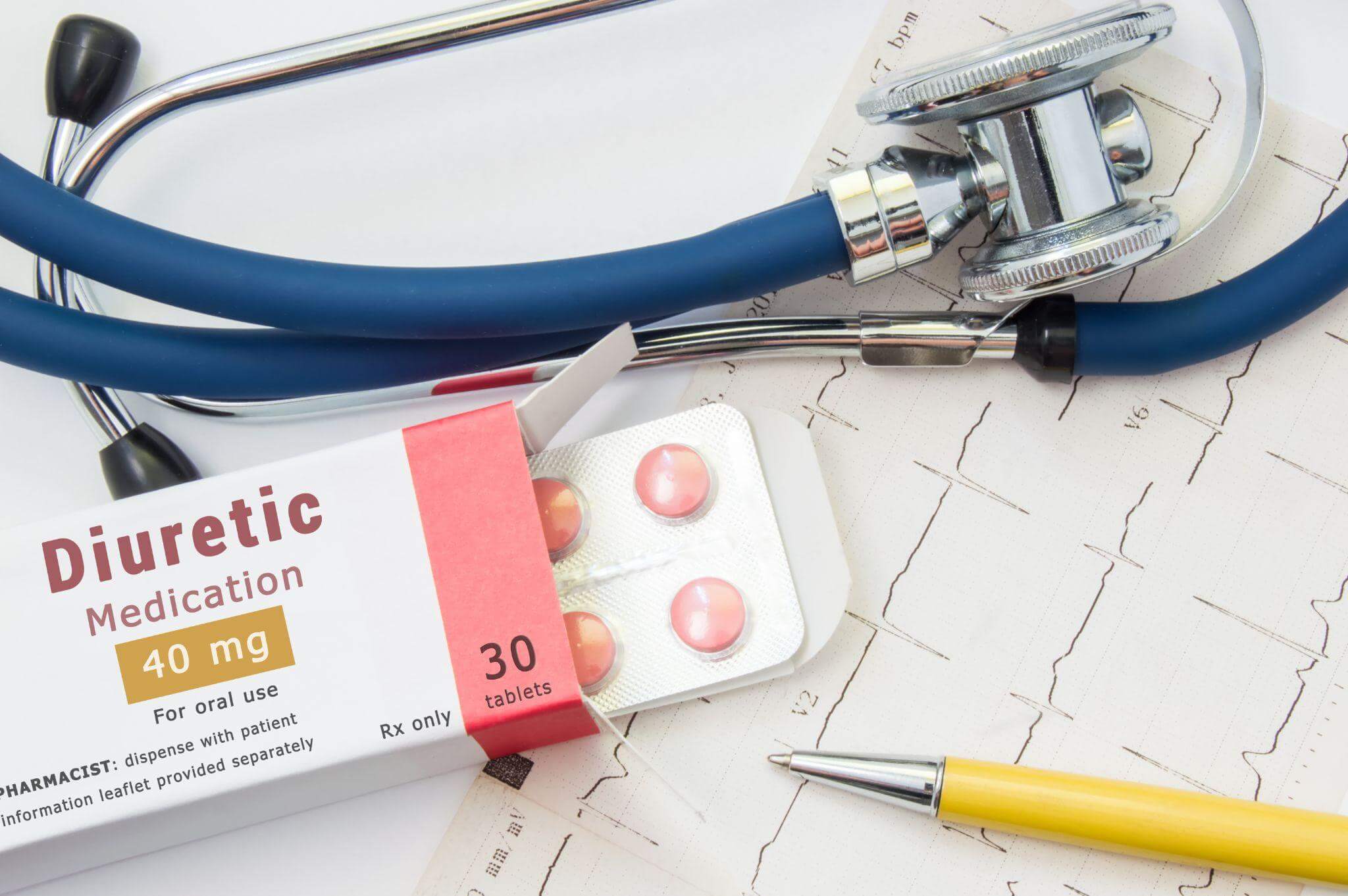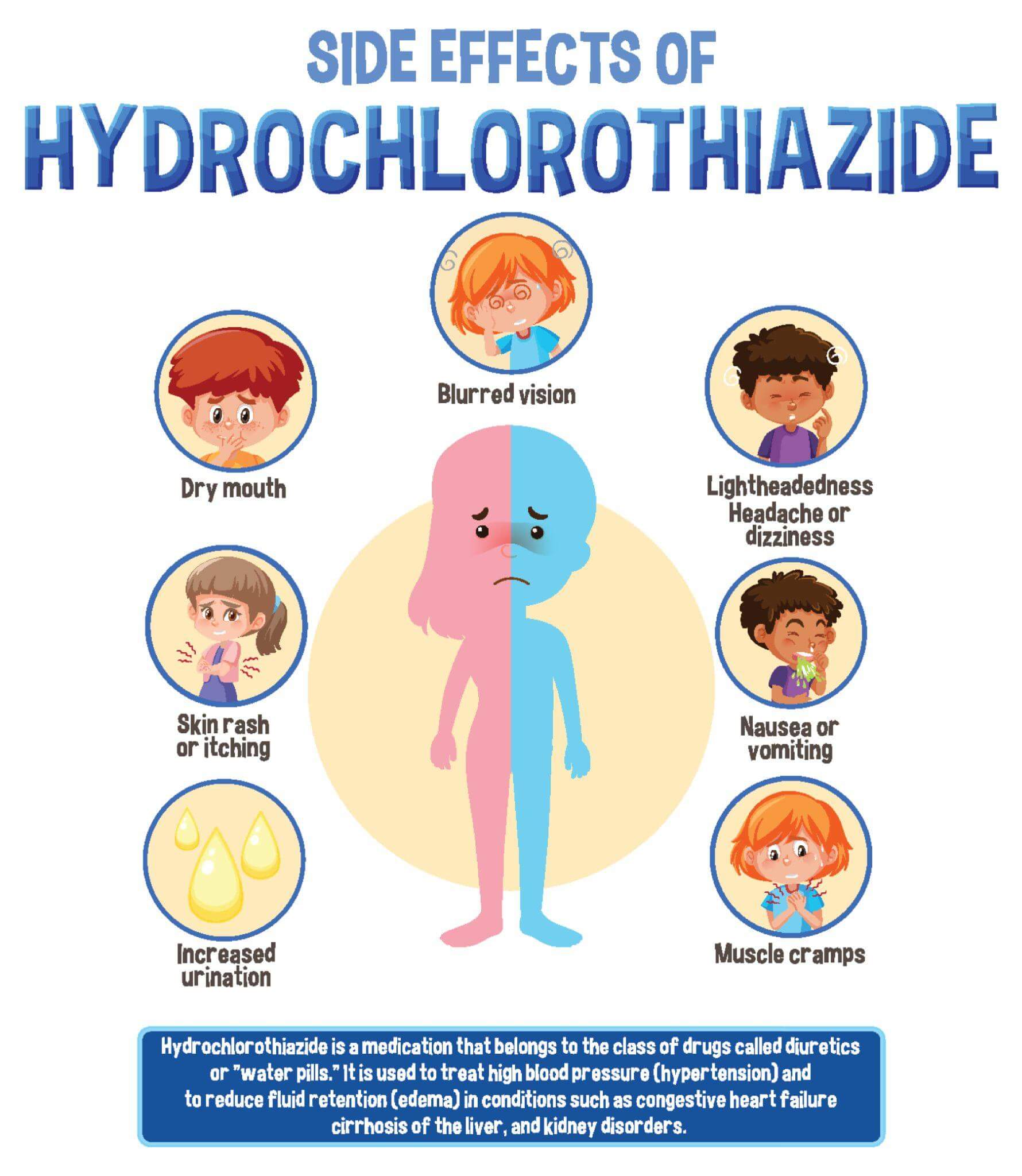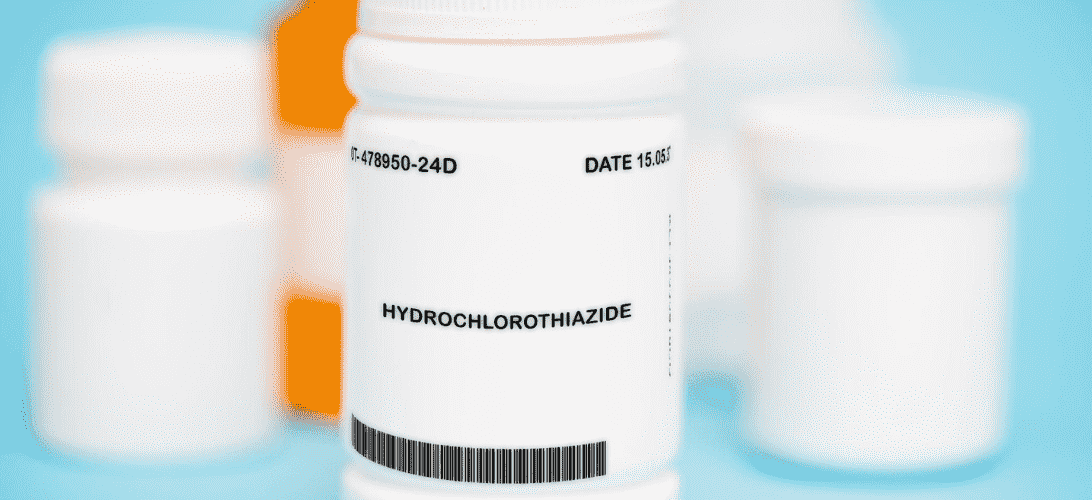Highlights
- Hydrochlorothiazide is a water pill that helps your body get rid of the excess water it may retain.
- Doctors also prescribe hydrochlorothiazide for high blood pressure.
- Call your doctor immediately if you experience severe hydrochlorothiazide side effects.
Your doctor may prescribe hydrochlorothiazide (frequently called HCTZ) if you have problems with water retention. Water retention can occur as a result of many diseases and conditions. Kidney problems, liver disease, and heart disease can all cause edema, and hydrochlorothiazide can help your body lose the excess water.
What is Hydrochlorothiazide, and What Is It Used For?
Hydrochlorothiazide is a thiazide diuretic that’s also known as a “water pill.” It works by preventing your body from absorbing too much salt, which can lead to water retention.
Hydrochlorothiazide drug acts on the filtration system of your kidneys. This system determines which salts the kidneys eliminate through urine. By increasing the amount of these salts, hydrochlorothiazide prevents salt and water accumulation in the body.
Doctors use hydrochlorothiazide to treat patients whose bodies retain water. Medical conditions that can lead to water retention are:
- Heart failure
- Cardiomyopathy
- Chronic lung disease
- Liver disease
- Thyroid problems
- Kidney disease
- Malnutrition
Being overweight or pregnant can also lead to water retention. Some medications, like corticosteroids, antidepressants, and hormone replacement therapies, can also cause your body to retain water.
Hydrochlorothiazide can also be used to treat hypertension (high blood pressure).
How Does Hydrochlorothiazide Work?

Hydrochlorothiazide acts on the distal convoluted tubules, kidney structures responsible for maintaining electrolyte balance. It causes increased loss of sodium and potassium through urine. The body can’t metabolize this drug, so it eliminates it through urination.
Doctors believe that it achieves its effects on blood pressure by dilating the blood vessels by blocking an enzyme called carbonic anhydrase.
Like some other diuretics, hydrochlorothiazide lowers blood pressure. Doctors often prescribe it for that use, but it’s not as effective at that job as ACE inhibitors or calcium channel blockers. While it lowers blood pressure, hydrochlorothiazide doesn’t reduce cardiovascular risk.
Taken orally, hydrochlorothiazide starts to act after about two hours. It reaches peak potency in four hours, and its effects linger for four to six hours.
If you have high blood pressure, your doctor may prescribe hydrochlorothiazide alone or in combination with other antihypertensive medications.
Hydrochlorothiazide Dosage and Administration
The dosage and administration of hydrochlorothiazide depend on the condition for which you take it and your doctor’s prescription. Always take this drug exactly as your doctor prescribes it.
Here are some general dosage guidelines.
For Edema
The usual prescription for this condition is a 25 milligram or 100 milligram pill once or twice daily. Some people respond better to intermittent dosing. Doctors may prescribe the medication on alternating days or only three to five days a week to prevent side effects like electrolyte imbalance.
For High Blood Pressure
The usual initial dose for high blood pressure is 25 milligrams per day. For maintenance, doctors may increase that dose to 50 milligrams or two 25 milligram doses per day.
Dosing also depends on whether patients take other blood pressure medications with hydrochlorothiazide.
For Nephrocalcinosis
The initial dose is 20 milligrams per day. The maintenance dose can be as high as two 50 milligram doses per day.
For Diabetes Insipidus
The starting dose is 50 milligrams per day. The maintenance dose is 100 milligrams per day.
For Osteoporosis
The starting dose is 25 milligrams per day. The maintenance dose is 50 milligrams per day.
For Edema Treatment in Children
- Babies under 6 months: 3 milligrams per kilogram of body weight per day in two doses.
- Children under 2: 1-2 milligrams per kilogram of body weight per day in one or two doses.
- Children aged 2-12: 1-2 milligrams per kilogram of body weight per day in one or two doses.
For High Blood Pressure in Children
- Babies younger than 6 months old: A maximum of 3 milligrams per day per kilogram of body weight in two doses.
- Children under 2: 1-2 milligrams per kilogram of body weight per day in one or two doses. The maximum daily dose can’t exceed 37.5 milligrams.
- Children aged 2-12: 1-2 milligrams per kilogram of body weight per day in one or two doses. The maximum daily dose can’t exceed 100 milligrams.
The medication is available in pill form, and patients take it orally. If you miss a dose, skip it and move on to the next one. Do not take two doses to make up for a missed one, as you may overdose. See What Should I Do If I Overdose on Hydrochlorothiazide? below.
What Strengths and Formulas are Available for Hydrochlorothiazide?
Hydrochlorothiazide is available in a 12.5 milligram oral capsule form and oral tablets of 12.5 milligrams, 25 milligrams, and 50 milligrams. BidRx also carries a 100 milligram oral tablet.
Hydrochlorothiazide is also available in many combination medications; the table above shows some of the most common. For example, a commonly prescribed combination is hydrochlorothiazide and lisinopril combined in a single pill. Lisinopril is an angiotensin-converting enzyme (ACE) inhibitors, a different class of drug used to treat high blood pressure. For many people, combining more than one class of blood pressure medication works best.
The hydrochlorothiazide-lisinopril combination is available in generic form or as brand names Prinzide and Zestoretic.
What are the Potential Side Effects of Hydrochlorothiazide?

Hydrochlorothiazide can have many common and rarer but more-severe side effects. Here’s a list of the common side effects of the drug:
- Electrolyte imbalance and its symptoms: shock, dizziness, brain swelling, confusion, irritability, lethargy, and nausea
- Weakness
- The sensation of passing out
- Upper stomach pain that spreads to the back
- Chills
- Fever
- Cold hands
- Skin and mouth sores
- Easy bruising
- Tiredness
- Lightheadedness
- Shortness of breath
The drug may cause other side effects not listed here. Always mention new or unusual symptoms to your doctor.
Some of the less-common yet more-severe side effects of hydrochlorothiazide are:
- Constipation
- Vomiting
- Thirst
- Dehydration and its symptoms: hotness, sweating, dry skin, inability to urinate
- Lightheadedness
- Eye pain and vision problems
- Jaundice
- Shortness of breath
- Chest pain
- Wheezing
- Bleeding from the nose, mouth, rectum, or vagina
- Irregular heartbeats
- Muscle cramps
Call your doctor immediately if you experience any of these severe side effects. Remember that side-effect lists are never complete. Because every body is different, drugs can cause side effects that doctors and pharmacists may not have seen before.
What Should I Avoid When Taking Hydrochlorothiazide?
As with most drugs, there are certain things you should avoid while taking this medication. They include:
- Alcohol: Drinking alcohol while taking hydrochlorothiazide can lower your blood pressure further and may increase the likelihood of dizziness or lightheadedness. It’s best to moderate or avoid alcohol during your treatment.
- Certain medications: Certain medications can interact with hydrochlorothiazide, affecting its effectiveness or causing adverse effects. See Are There Any Drug Interactions That I Should Know About below.
- Inform your doctor about all the medications you are currently taking, including over-the-counter drugs, supplements, and herbal remedies. They can advise you on any potential interactions to be aware of.
- Too much potassium: Hydrochlorothiazide can cause a loss of potassium in your body. To maintain a healthy potassium balance, avoid excessive consumption of foods high in potassium, and don’t take potassium supplements without consulting your doctor. Regular monitoring of your potassium levels may be necessary during treatment.
What Should I Do If I Miss a Dose of Hydrochlorothiazide?

If you miss a dose of hydrochlorothiazide, don’t take two doses to make up for it. Instead, just take your next dose as scheduled. It is important to take hydrochlorothiazide regularly to keep your blood pressure under control. If you miss too many doses, your blood pressure may rise and you could be at risk for health problems.
What Should I Do If I Overdose on Hydrochlorothiazide?
If you suspect an overdose of hydrochlorothiazide, take immediate action. Here are the steps you should follow:
- Call emergency services: Dial 911 or your local poison control center right away. Inform them about the situation and provide details of the medication, dosage, and the amount you believe you have taken.
- Follow medical guidance: The emergency operator or poison control center will provide you with specific instructions on what to do next. They may advise you to go to the nearest emergency room or provide guidance on managing the overdose at home, depending on the severity of your situation.
- Do not induce vomiting: Unless instructed otherwise by medical professionals, it’s generally not recommended to induce vomiting as a response to an overdose. Vomiting can potentially worsen your situation or cause complications.
- Provide information: When seeking medical assistance, bring the container or packaging of the medication with you to the hospital. This can help healthcare providers assess the situation more accurately and provide appropriate treatment.
- Receive medical evaluation and treatment: Once you reach the hospital or medical facility, doctors and healthcare professionals will evaluate your condition and provide necessary treatment. They may take measures to remove the excess hydrochlorothiazide from your system and monitor your vital signs.
Remember, an overdose of hydrochlorothiazide can be serious, and prompt medical attention is crucial. It’s always advisable to keep medications out of reach of children and to take them strictly as prescribed by your healthcare provider to minimize the risk of an overdose.
Who Should Not Take Hydrochlorothiazide?

Some people are not good candidates for hydrochlorothiazide therapy. You may not be able to take this medication if you:
- Have an allergy to hydrochlorothiazide: Report allergic reactions to your doctor right away; they can be fatal.
- Are allergic to penicillin or sulfa drugs: Allergies to these medications may also indicate an inability to take hydrochlorothiazide.
- Are unable to urinate: Your doctor may ask you to stop the drug immediately.
- Have certain medical conditions: Inform your doctor if you have glaucoma, kidney disease, liver disease, diabetes, asthma, gout, or any drug allergies before starting hydrochlorothiazide.
- Are at risk of dehydration: Since hydrochlorothiazide is a diuretic, caution should be exercised in hot weather and during exercise. It is important to follow your doctor’s instructions on the appropriate type and amount of liquids to consume.
- Drink alcohol: Drinking alcohol while on hydrochlorothiazide can increase its side effects and contribute to dehydration risk.
- Drink excessive amounts of water: Drinking too much water while taking hydrochlorothiazide can be as dangerous as dehydration itself.
- Take certain other medications: Discuss all medications, including supplements, vitamins, and herbal extracts, with your doctor, as hydrochlorothiazide may interact with them and lead to severe problems.
- Have certain medical conditions: Conditions such as low sodium or potassium levels, thyroid gland disorders, high calcium levels, anuria (inability to urinate), lupus, electrolyte loss, or hyperlipidemia may disqualify you from hydrochlorothiazide therapy.
- Are pregnant or planning to become pregnant: Hydrochlorothiazide is not recommended during pregnancy due to potential risks to the baby, including jaundice. Its effects on the fetus have not been extensively studied in humans.
- Are breastfeeding: Hydrochlorothiazide is not recommended for breastfeeding women, as it may pass into breast milk and potentially harm the baby.
Are There Any Drug Interactions With Hydrochlorothiazide That I Should Know About?

Hydrochlorothiazide can interact with many other drugs, vitamins, and herbal supplements. Some drugs can make you lightheaded. If you take these drugs with hydrochlorothiazide, the lightheadedness can become worse. Some of the drug classes that can cause interactions with hydrochlorothiazide are:
- Muscle relaxers
- Some steroids
- Sleeping pills
- Opioid medications
- Seizure and anxiety drugs
- Other blood pressure drugs
- NSAIDs like aspirin, ibuprofen, and diclofenac, among others.
Be extra careful with these medications:
Drug interaction lists are never complete. At least 449 known medications can interact with hydrochlorothiazide, and new drugs are continually being developed. For this reason, you must be sure that all of your medical providers have updated medication lists, including all over-the-counter medications and supplements that you take. And be sure to report any new or unusual symptoms to your provider right away.
Are There Special Precautions I Need to Take With Hydrochlorothiazide?
Yes. In addition to the drug interactions listed above, there are a few other potential problems to keep in mind when taking hydrochlorothiazide.
These include:
- Dehydration: Hydrochlorothiazide can cause dehydration, so it’s important to drink plenty of fluids, especially in hot weather or when you’re exercising. Dehydration may cause a dangerous drop in your blood pressure. If your body loses too much water, you may also experience a severe electrolyte imbalance.
- Lightheadedness: Hydrochlorothiazide can cause lightheadedness, so it’s important to sit or stand up slowly to avoid dizziness. If you feel dizzy, don’t operate cars, heavy equipment like tractors, or do anything capable of causing harm to you or others.
- Sun exposure: Hydrochlorothiazide can increase your risk of skin cancer, so it’s important to wear sunscreen and protective clothing when you’re in the sun. Your doctor may recommend more frequent skin examinations to head off potential problems.
- Blood pressure: It’s important to have your blood pressure checked regularly while you’re taking hydrochlorothiazide.
- Dietary guidelines: Your doctor may recommend specific dietary instructions. These may include reducing salt intake or maintaining a balanced diet to support electrolyte balance. Following these instructions can enhance the effectiveness of the medication.
- Surgery: If you need to have a surgical procedure, your doctor may want to make changes to your hydrochlorothiazide regimen. This drug can interact with anesthesia and other medications used during surgery. In some cases, your doctor may tell you to stop taking hydrochlorothiazide a few days before surgery. This is to prevent any potential interactions that could lead to complications during or after surgery.
Always take hydrochlorothiazide exactly as prescribed and heed the warnings. Keep all of your scheduled follow-up appointments so your healthcare provider can monitor side effects and ensure your medication works as intended. Don’t stop taking hydrochlorothiazide without your doctor’s okay, even if you feel well — high blood pressure can be symptomless.
Get the Lowest Price for Hydrochlorothiazide with BidRx

Hydrochlorothiazide helps you keep your blood pressure under control and avoid problems like congestive heart failure, stroke, and damage to your blood vessels. These problems can be life-threatening or extremely damaging to your quality of life.
At BidRx, you can place a bid and have pharmacies compete to give you the best price.
Log on to BidRx, create an account, and look up the medication you need on our medication page. Get the lowest price for hydrochlorothiazide with BidRx.
